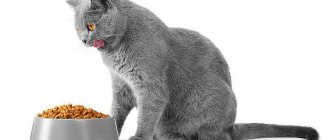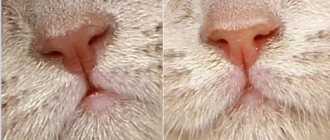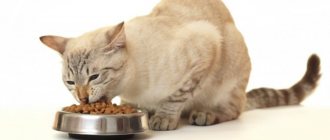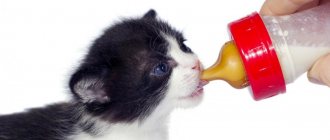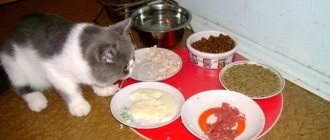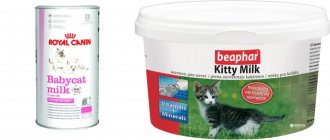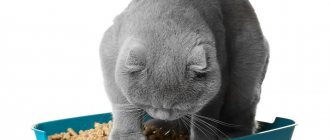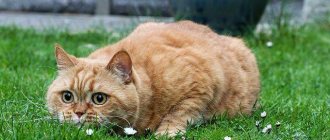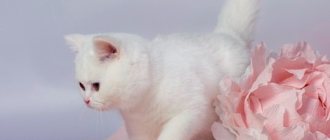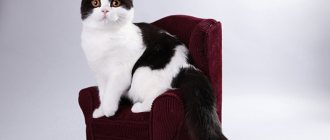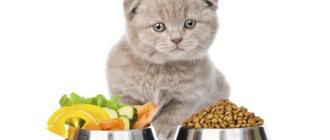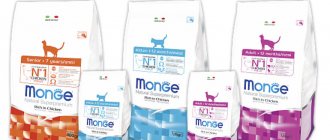British is an artificially bred breed. Not all foods that are fed to barn cats are suitable for her. The health and longevity of the pet depends on how responsibly the owner approaches the preparation of the diet. And for kittens, proper nutrition is doubly important. Therefore, when it comes to feeding, recommendations from veterinarians and experienced breeders of British cats will not hurt.
Choosing a place and utensils for feeding
A British cat should have a separate place for eating. Important terms:
- safety;
- comfort;
- privacy;
- availability.
You should not feed your Briton in a hallway where people often walk, or in a room with a TV constantly on. Extraneous noise will distract the cat.
For your information. If there is already a pet in the apartment, it is better to feed the kitten separately at first. Otherwise, the older pet may take the food away from him.
British cats are best fed from deep stainless steel or ceramic bowls. The dish should be wide enough so that the mustache does not rest against the sides. After each feeding, the bowls are washed, and the area where the cat ate is wiped with a damp cloth. You can put oilcloth or a rubber mat there - this will greatly simplify cleaning.
How to feed a cat when it is sick
The British, although known for their excellent health, have their Achilles heel. Even a few. These are their signature ailments that can be combated with a well-designed diet:
- If you have urolithiasis, you should consider reducing the composition of minerals. Pets who eat dry food often fall into the mineral risk zone. The food was probably chosen incorrectly. Therefore, it is imperative to ensure that there is no such harmful component in the composition. There must be clean, fresh water in the bowl - without this, you can forget about ridding your cat of kidney stones.
- With hypertrophic cardiomyopathy, it is advisable to take a closer look at the amount of salt absorbed by your pet. The less salt the better for the fluffy core. Previously, there was an opinion that such animals should consume less protein. This point of view can hardly be called correct, since as a result the animal lost a lot of muscle mass. As a result, they lived fewer years than they could have.
The British cat is extremely prone to obesity. We can say that she is the Achilles heel of furry companions. But well-chosen food will help avoid such troubles. Like many others.
Previous British catsDiseases in British cats and kittens - symptoms and solutions Next British catsCare and maintenance of the British cat breed
Natural diet
Many owners prefer to feed their British cat natural food at home. It is believed that this is the most physiological type of nutrition. Cats are carnivores by nature, so their diet must include meat and other products that are available to animals in the wild.
What foods should be given?
The basis of the diet (60-70%) of British shorthair and longhair cats is made up of lean meats - beef, chicken, turkey. Lamb, pork, geese and duck meat are too fatty, so they should not be fed to pets.
About 2 times a week the menu includes offal:
- boiled liver;
- heart;
- kidneys;
- lungs;
- language;
- chicken stomachs.
They provide the body with amino acids and add variety to the daily menu.
Another important component of the diet (25-30%) is vegetables, fruits and herbs. These are sources of vitamins, minerals and dietary fiber.
It is useful to feed British cats:
- carrots;
- cucumbers;
- asparagus;
- pumpkin;
- zucchini;
- apples;
- apricots;
- sprouted oats;
- lettuce leaves;
- dill
Vegetables and herbs are given in the form of salads or mixed into meat. Fruits can act as treats.
Once every 3-4 days, British cats are fed boiled sea fish. It must be cleaned of bones and scales.
At home, British cats are also fed fermented milk products: low-fat kefir, cottage cheese, curdled milk, natural yogurt. Once a week they pamper you with grated cheese.
Important. Only kittens can be given milk. It is usually not absorbed by adult cats.
To provide your pet with additional energy, the menu includes rice and buckwheat porridge. They account for 5-10% of the total food volume.
British cats are fed chicken or quail eggs 2-3 times a week. These products do not need to be boiled if the owner is sure that they are not contaminated with pathogenic bacteria.
It is preferable to use only the yolk. It is given separately or mixed with fermented milk products.
For your information. If you feed your British cat correctly, she will have a shiny coat, clear skin and clear eyes.
Rules and regulations for preparing natural food
If you feed a British cat natural food, you should adhere to the following rules:
- British cats are fed only fresh food. You can freeze a few portions for an emergency, but you can’t use this method all the time.
- Meat can be given raw, but first it must be scalded with boiling water or frozen for 2-3 days. This is necessary to destroy parasites.
- The British are fed thick food at room temperature. If the food was in the refrigerator, it must be reheated.
- Vegetables, meat and fish are not mixed with fermented milk products.
- Meat is given along with vegetables and herbs.
The daily feeding rate for British breed cats is about 5% of their weight, or 40-60 g of food per 1 kg of weight. The serving size is adjusted according to the age, activity level and individual characteristics of the animal.
Important. British cats are prone to obesity - they should not be overfed.
Natural food
If the owner of a British cat has enough free time to prepare a varied menu for his pet, then a diet based on natural products is an excellent option.
Balanced food for British breed cats must necessarily consist of meat, fish, vegetables and cereals, as well as dairy products. During the molting period, it is recommended to add vitamin complexes and brewer's yeast to the food.
Not all meat and offal are suitable for feeding a British cat; the optimal types are:
- beef;
- veal;
- chicken;
- turkey;
- rabbit meat.
Before consumption, the meat must be defrosted and doused with boiling water. You can make minced meat from poultry, veal and beef by adding boiled cereals and vegetables, and also serve it boiled.
Liver (beef or chicken) can be given no more than once a week, like eggs. Many owners note that the British happily eat boiled kidneys, heart, tongue, and lungs.
If you feed natural food, then do not forget to include ocean or sea fish in your diet:
- cod;
- pollock;
- navaga;
- hake.
It is better to avoid feeding river fish: it contains less unsaturated fatty acids, which are responsible for the good condition of the coat, but there are a great many small bones that are dangerous for the animal. Before feeding, fish and other seafood must be boiled.
Vegetables on a British menu should be represented by root vegetables containing the least amount of starch; products such as:
- beet;
- carrot;
- white cabbage;
- cauliflower;
- cucumbers;
- zucchini.
The most useful cereals to feed are rice, buckwheat, oatmeal, and barley. It is imperative to feed your British cat fermented milk products without dyes or sweeteners:
- low-fat cream and sour cream;
- cottage cheese;
- natural yogurt;
- fermented baked milk;
- kefir
Ready-made feed
Many owners prefer to give their Britons dry food and wet canned food - it’s convenient and simple. But the products must be of high quality - not lower than premium.
It is better to avoid buying cheap food from the nearest supermarket. Economy class food contains practically no natural meat. But they contain ballast substances, dyes, flavors and other harmful components.
You should carefully study the composition of the feed. Meat should come first. Good products contain vitamins, minerals and amino acids that support the health and strengthen the immune system of the British cat. A minimum of carbohydrates is encouraged - they lead to weight gain.
Selection of industrial feed
Owners of British cats consider the following brands to be the best food:
- Earthborn Holistic;
- Go! Natural Holistic;
- Bosch Sanabelle Grande;
- Acana;
- Orijen;
- Eukanuba;
- Eagle Pac Cat Holistic;
- 1st Choice.
This is a super premium class and holistic food. They are quite expensive, but their composition fully satisfies the needs of the cat's body.
If your budget is limited, you can purchase premium food for the British:
- Purina Pro Plan;
- Brit Premium;
- RoyalCanin;
- Hill's.
The Royal Canin company produces a special food for British kittens that can be fed to babies aged 4 to 12 months - British Shorthair Kitten. It is highly digestible and contains prebiotics that support the functioning of the gastrointestinal tract.
Royal Canin produces British Shorthair Adult food for adult cats. It helps Britons maintain muscle mass. Omega-3 fatty acids strengthen joints and maintain their mobility.
For kittens, pregnant, lactating, spayed, neutered, elderly cats or pets with any diseases, buy food from specialized lines. All well-known manufacturers have such names.
Before choosing food for your British cat, it is better to consult a veterinarian. He will give individual nutritional recommendations.
TOP 12: RANKING OF THE BEST FOOD FOR BRITISH CATS
Food rating for the British:
- Orijen – 80% protein, 20% vegetables and fruits
- Acana – 70% protein, 30% vegetables and fruits
- Wildfield – 60% protein, 40% vegetables and fruits
- Farmina – grain-free food + probiotics, medicinal herbs
- Trainer – food for animals with sensitive digestion, kidney problems, etc. These foods help maintain health. Suitable for animals with gluten intolerance. Products for processing into feed are steamed.
- Science Plan (Hills) is a good food for everyday nutrition, well digestible, does not cause allergies, natural antioxidants and preservatives, a wide range of feeds, excellent distribution.
- Bosch cellulose and maize additives are harmful and can cause allergies.
- OK Passion – not suitable for sensitive cats
- Purina ProPlan - high in protein, rice is used as a cereal, but wheat flour is still added. Probiotics.
- Royal Canin (Royal Canin) - there is an everyday line and a medicinal one. Everyday series - a lot of preservatives (the Russian line of food is not recommended, it is better to give preference to the French one). The medicinal series is perfectly balanced and has good reviews from veterinarians and has a healing effect.
- Premil – additives and flavor enhancers. No gluten.
- Josera - Overall a good food, it rarely causes allergies, it contains corn gluten.
*All these foods contain minerals, vitamins, and beneficial additives.
The material is for informational purposes only, presented solely as an example for comparison.
Take proper care of your pets and choose the best food for them!
Mixed feeding
Breeders and felinologists do not recommend feeding the British cats both natural food and industrial food. This is fraught with problems with digestion and urination. In addition, it will be difficult for an inexperienced owner to balance the diet and calculate its calorie content.
Sometimes a British cat can still be given different types of food, but this needs to be done at different feedings. For example, offer your pet dry kibble in the morning and meat in the evening. But it is not recommended to practice this method constantly.
How to feed a cat when it is sick
The British, although known for their excellent health, have their Achilles heel. Even a few. These are their signature ailments that can be combated with a well-designed diet:
- If you have urolithiasis, you should consider reducing the composition of minerals. Pets who eat dry food often fall into the mineral risk zone. The food was probably chosen incorrectly. Therefore, it is imperative to ensure that there is no such harmful component in the composition. There must be clean, fresh water in the bowl - without this, you can forget about ridding your cat of kidney stones.
- With hypertrophic cardiomyopathy, it is advisable to take a closer look at the amount of salt absorbed by your pet. The less salt the better for the fluffy core. Previously, there was an opinion that such animals should consume less protein. This point of view can hardly be called correct, since as a result the animal lost a lot of muscle mass. As a result, they lived fewer years than they could have.
The British cat is extremely prone to obesity. We can say that she is the Achilles heel of furry companions. But well-chosen food will help avoid such troubles. Like many others.
Algorithm for switching to a different diet
A British cat cannot be suddenly switched from dry food to natural food, and vice versa. Sudden changes in diet disrupt the functioning of the digestive system.
New food is introduced gradually over 10-14 days. First, 25-30% of the usual food is replaced, and the rest of the food is left the same.
After 2-3 days, the proportion of unfamiliar food is increased by another 10-15%. This is done until the British cat completely switches to the new diet.
During the process, the condition of the animal is closely monitored. If allergies, indigestion or other negative reactions appear, return to the usual menu. In such situations, the cat is taken to the veterinarian so that a specialist can help choose the appropriate diet.
Often British people refuse to eat natural food after ready-made food. In this case, you can give your cat a fasting day. Most likely, when she gets hungry, she will eat whatever her owner offers.
Hill's Nature's Best™ With Real Chicken Adult Cat
Hill's Pet Nutrition has been caring for pets since 1939. Its main mission is to develop food for veterinary use. That is why veterinarians around the world most often recommend Hills's brand food.
Nature's Best With Real Chicken Adult Cat is a carbohydrate-containing food suitable for all adult cats, particularly British cats.
The food consists of high-quality natural ingredients with the addition of vitamins and minerals, taurine to support normal heart function and retinal function. Contains Omega-3 and Omega-6 fatty acids for healthy skin and a shiny coat.
Ingredients: chicken, chicken liver, egg powder, oat fiber, brewer's rice, peas, carrots. Contains cornmeal and wheat
Should be given with caution - it promotes rapid weight gain. The food is enriched with vitamins and minerals
Advantages: designed specifically for adult cats and cats over 1 year old. Has a gentle effect on the digestive system. It has a natural taste that your pet will love. There are no ingredients that can cause gastrointestinal disorders or skin diseases. Ideal balance of nutrients.
Disadvantages: contains wheat and corn gluten - may cause allergies. There are also food colorings.
Vitamins and mineral supplements
If a British cat is fed natural products, vitamin and mineral complexes must be included in the diet. Many owners use natural supplements:
- Brewer's yeast;
- bone meal;
- fish fat.
The dosage appropriate for a particular pet is determined by the veterinarian.
A couple of times a year, it is beneficial for British cats to drink complex industrial supplements. They are used in courses of 1-3 months. Continuous use is fraught with health problems.
The following brands of vitamins have proven themselves to be effective:
- 8 in 1;
- Kitzyme;
- Gimpet;
- Omega Neo;
- Sanal;
- Veda Biorhythm;
- Canina.
There are also drugs on sale to eliminate problems with hair, internal organs, etc.
Can I feed them regular food?
It cannot be said that the definition of “ordinary food” is appropriate for the diet of British kittens. But home-cooked food is quite appropriate in their diet. You just need to approach the process of preparing it correctly. For example, you won’t be able to do without meat, because cats are carnivores by nature.
Beef
It is administered already in the first month of life, in the form of scraped meat fibers. You can also use minced meat without any additives. The meat is pre-frozen for at least three days, then thawed and doused with boiling water to destroy bacterial flora. Both fresh and chopped beef must be given without any additives; salt, spices, and onions in any quantities are excluded. As the pet grows, the meat is given cut into small pieces.
By-products
From the third month of life, the little Briton is ready to absorb offal. Boiled beef liver is introduced weekly as complementary food, and chopped offal (heart and other liver) is also mixed into the main food 3-4 times a week. One serving should not exceed 100 g.
Fish
Only sea fish is suitable, preferably in fillet form - without extra bones. Serve it raw or boiled to the kitten.
It is important to properly pre-treat the product. Freeze it for 3 days, and then pour boiling water over it to destroy helminth eggs.
Eggs
Egg yolk is a valuable source of vitamin D, which protects the baby’s bones from deformation, the development of rickets and other possible health problems. It is mixed into porridge and other dishes, after being crushed. The frequency of introduction into the diet is 1 time per week.
Porridge
The main source of nutrition for a kitten in the first months of life is food that does not require significant effort in absorption, but is nutritious and satisfying. This category includes all porridges, which are cooked differently at each age. For up to three months, food is cooked in milk with the addition of water, sugar is completely excluded. From the age of six months, the dish is given 3-4 times a week. They cook completely dairy-free rice, oatmeal, and semolina cereals.
Vegetables
An obligatory component of a British child's diet is boiled vegetables rich in fiber. Children are given carrots and cauliflower, chopping the ingredients and flavoring them with a small amount of vegetable oil. You can add prepared vegetables to the main meat dish or porridge.
Dairy products
The source of calcium in the kitten’s diet 3-4 times a week is fermented milk products - natural yoghurts without sugar or additives, cream, cottage cheese, kefir. You should choose a product with a low fat content.
Water in the diet
British cats should always have access to clean water. It is renewed 1-2 times a day - aristocratic Englishmen often refuse to drink stale liquid.
Water is especially necessary if the cat is fed dry kibble. They are dehydrated, so the pet drinks 2-3 times more than when eating natural food.
It is not recommended to give tap water to animals. It contains chlorine and other harmful impurities. Therefore, it is pre-filtered and settled. Some owners buy bottled water. Naturally, without gas.
Important. If a British cat drinks little, she may develop urolithiasis. This pathology especially often appears after castration.
Nutrition for spayed and neutered British dogs
Food for British cats after castration or sterilization differs in composition from the diet of a healthy cat. After surgery, not only the animal’s hormonal levels are reconstructed, but also the cat’s entire body and its main systems.
If a sterilized cat or neutered cat eats ready-made food, you need to buy special food for neutered cats, which is available from all popular manufacturers.
With a natural diet, you should adhere to a diet in which the content of calcium, magnesium and phosphorus is minimal, since there is a possibility of developing urolithiasis, especially in cats.
It is necessary to exclude cheese and fish from the diet, and feed mainly dairy products and meat. For sterilized cats, it is very useful to give kefir and low-fat cottage cheese.
What to feed a British kitten
For the first month after birth, a Briton feeds exclusively on mother's milk. It provides babies with all the necessary substances and promotes the formation of strong immunity.
If there is no mother, British kittens should be fed with cat milk substitutes, which are sold in veterinary pharmacies. It is not recommended to give baby food. It is designed for people, not animals.
A one-month-old kitten begins to be fed breast milk in the intervals between meals. The baby is carefully introduced to solid food so that at 2-3 months he is ready to move to a new home.
For your information. The British Fold kitten, which is usually a mix with the Scottish Fold, is fed the same as a straight-eared kitten.
An approximate feeding schedule for a British kitten by age is presented in the table.
| Age | Number of feedings per day | Diet |
| British kittens: 1 month | 3-5 | · small pieces of beef; · porridge with milk; milk for kittens |
| British kitten: 2 months | 6-8 | · small pieces of beef; · low-fat cottage cheese; · porridge with milk; milk for kittens |
| British kitten: 3 months | 6 | from three months, chicken, vegetables and egg yolk are introduced into the diet, and milk for kittens is replaced with goat or cow milk; other products remain unchanged: pieces of beef; · porridge with milk; · low-fat cottage cheese |
| British kitten: 4-6 months | 5 | A British kitten at 4 months is gradually weaned off whole milk and switched to fermented milk products, the diet is enriched with: · offal; · boiled sea fish; · fruits |
| British kitten: 6-10 months | 3-4 | · all types of lean meat; by-products; · porridge; · vegetables, fruits, herbs; · dairy products; · eggs; boiled sea fish |
From 10-12 months, British kittens are fed twice a day. Now they eat the same foods as adult cats.
An alternative option is to use ready-made feed. Canned food and dry granules can be given to a small kitten of two months. The “drying” is soaked in water or milk so that the baby can chew it.
Gradually increase the proportion of dry food in the diet and reduce the amount of wet food:
- British: 3 months – 90% wet/10% dry;
- British: 4-6 months – 70-80% wet / 20-30% dry;
- British: 6-10 months – 60-70% wet / 30-40% dry;
- British: 10-12 months – 50-60% wet / 40-50% dry.
From the age of one year, the pet is given 30% wet food and 70% dry food. It is desirable that the products are from the same manufacturer. This minimizes the risk of digestive problems and allergic reactions.
The daily feeding rate for a British kitten is about 10% of its weight. When feeding dry food, follow the manufacturer's recommendations.
Have you bought a British Fold? Choose a diet for a Scot!
If you bought a British Fold kitten, then you have fallen for a scammer's trick. Only Scottish cats have fold ears. At the same time, both lop-eared and straight-eared kittens are born in the litter.
British Fold kitten is:
- Scottish fold cat with gray color.
- Mixed Scottish and British or mongrel cat.
- British cat with gene deficiency.
Have you already got a fold-eared kitten? In this case, you should know several important facts:
- The gene that causes lop ears in kittens is not complete. In lop-eared animals, especially if selection is carried out thoughtlessly, there is a high probability of developing ailments associated with the joints.
- Fraudulent breeders, trying to increase their income, deliberately breed two fold-eared cats, which is guaranteed to lead to disability of part of the litter.
- A fold-eared cat of unknown origin should absolutely not be bred, since its offspring may inherit defective genes.
Feeding an older cat
With age, British cats become less active, and metabolic processes in their bodies slow down. To prevent them from gaining weight, the caloric content of their diet is reduced.
The British cat is fed small meals 3-4 times a day so as not to overload the digestive system.
To improve intestinal function, some meat is replaced with vegetables. They contain fiber, which stimulates the gastrointestinal tract.
You need to carefully ensure that your pet consumes enough fluid. Many owners install drinking fountains. It has been noticed that cats drink from them more willingly.
When fed commercial food, an aging pet is switched to products from lines for older cats. If dental problems appear, the cat is given more canned food and pates, which are easier to chew.
If any illness occurs, veterinarians prescribe a special diet for the British.
Diet of pregnant and lactating cats
The nutrition of British cats that are pregnant or have just lambed should be enhanced and contain as much beef, veal and liver as possible. A pregnant British cat should be fed strictly in portions and not overfed, otherwise the kittens will be large and it will be difficult for her to give birth to them.
A nursing cat should not feel hungry; during lactation, the number of feedings increases up to 3-4 times. Portions are calculated based on the needs of the animal, its weight and the number of suckling kittens.
In the first days after giving birth, a British cat may lose its appetite; this is a completely normal reaction of the body. Afterwards, they usually love to eat and eat often and in small portions.
The amount of water consumed by the cat during this time also increases. A special feature of the diet of a young cat mother is the introduction of beef or chicken broth into the diet. It is given warm to improve lactation.
Prohibited Products
Most foods that people eat are not suitable for cats. The British should not be fed any salty, sweet, fried, fatty, smoked, or spicy foods. The cat's body is not adapted to digest such food, and the liver cannot cope with large amounts of toxic substances.
Also, the food of British cats should not include the following foods:
- River fish;
- tubular bones;
- sausages;
- semi-finished products, canned food and fast food;
- mayonnaise, ketchup and other sauces;
- chocolate, cocoa;
- eggplants, potatoes, legumes;
- mushrooms;
- citrus fruits, grapes, raisins;
- rhubarb, sorrel, onion, garlic;
- foods and drinks that contain alcohol, caffeine and other stimulants.
A British cat should not be fed food from the human table, even if it plaintively begs for a tidbit. Such handouts will result in serious health problems.
How to create a balanced diet?
Each owner decides for himself whether his pet will eat only dry or wet food, and in what proportion the dishes will be combined. Standard options: 50/50, 70/30, 60/40%. In any case, the animal should always have access to clean water. And food should be poured into the bowl only during feeding - the rest of the time it should be clean. To create a balanced diet, you can follow the example of experienced breeders who recommend:
- alternate feeding with dry and wet food (in the morning it is better to introduce soft pieces in sauce or canned food into the diet, then feeding continues with dry food);
- You should regularly offer the animal meat cut into small pieces;
- You should not skimp on food for a purebred or elite animal, as this will lead to a deterioration in its health.
Feeding frequency from birth to one year
From birth to 5 weeks
IMPORTANT: even at such a young age, the breeder already adheres to some type of nutrition. Babies cannot be given ready-made food for an afternoon snack one day, and something in its natural form the next day.
If the cat does not have milk, or she died in childbirth, and it was not possible to find a nurse, then British kittens, like all orphaned cats, are fed from special drinking bowls with goat's milk, or a special mixture in small portions 5-6 times a day. At the same time, kittens should not be given infant formula; they are too high in calories and oversaturated with sugar for cats.
From 5 to 9 weeks
The kittens still eat in small portions, 5 times a day, at least. The cat gradually stops natural feeding. Kittens, in turn, are actively growing and need complementary feeding as an inevitable and necessary source of calories and nutrients.
It is good to feed two-month-old kittens in the late afternoon, for example, by replacing the fourth feeding from the cat with complementary foods.
From 10 weeks to six months
From 2 to 6 months, kittens are completely weaned from the cat. They eat on their own 4-3 times a day. At 2-3 months it is better to feed 4 times. At 3-4 months, one of the daily doses is made smaller in volume. From 4-5 months they switch to 3 meals a day. At 6 months, the kitten should already be able to eat 3 times calmly, without asking for more.
IMPORTANT: Portion size is very important to follow. A kitten up to a year old is fed 30-35 grams at a time; the total weight of food per day should not exceed 130 grams
At this stage of maturation, British kittens need to be switched from pureed food to finely chopped food. It is better to refuse dry food in favor of canned wet food.
From 6 to 12 months
During this time period, the kitten is transferred to 2 meals a day, increasing the amount of food per day to 250 grams. Also during this period, the owner of the British cat must finally decide on the type of food and consult with a veterinarian on the selection of a vitamin complex to improve the balance of the selected menu.
